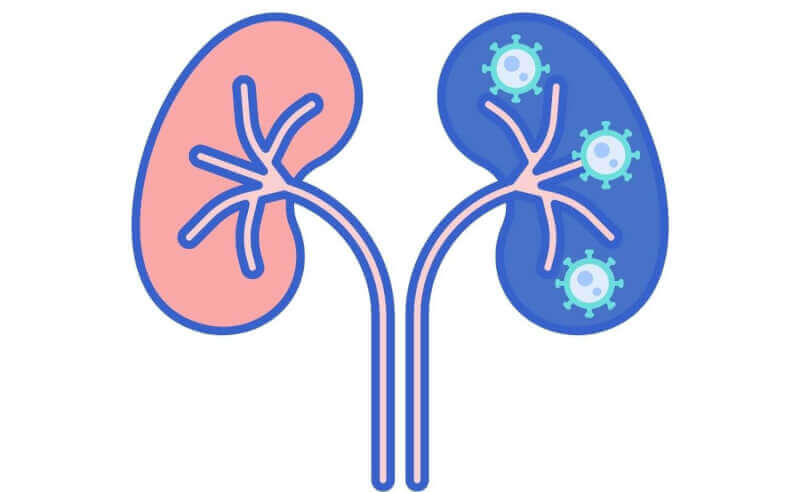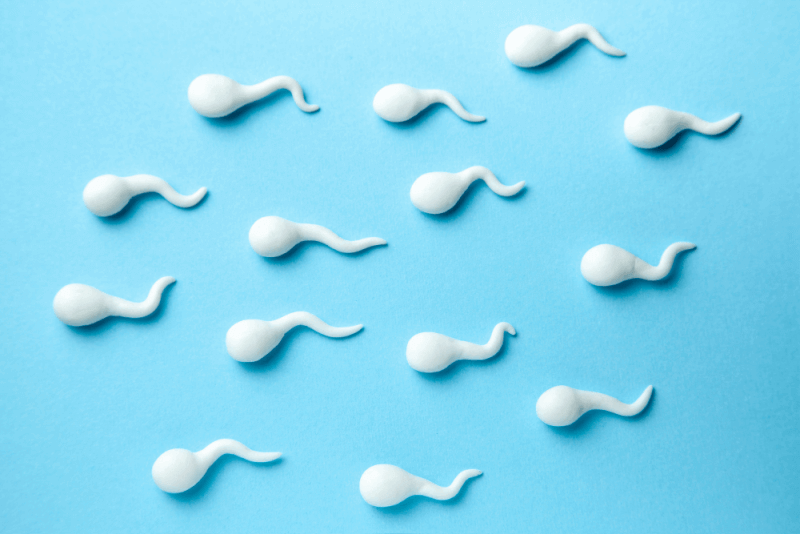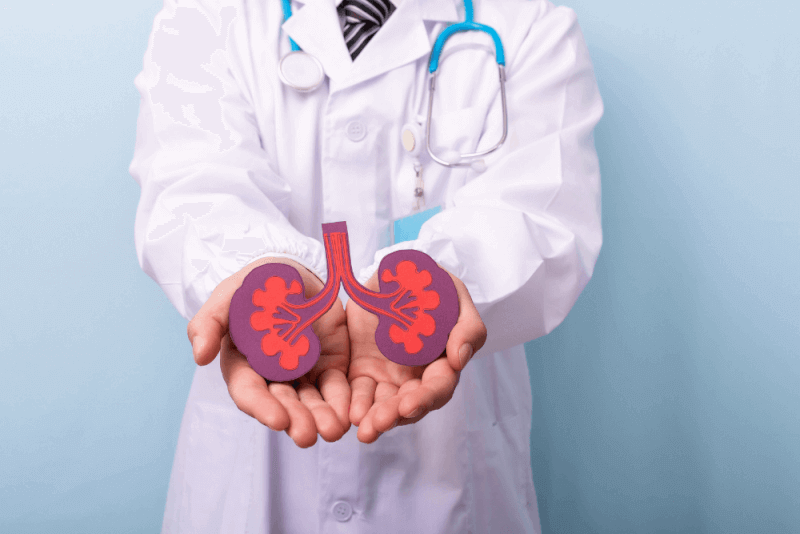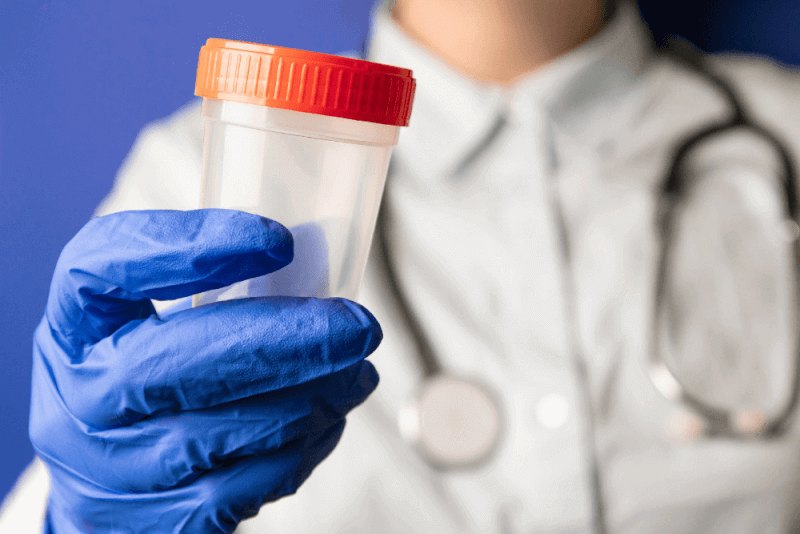What is Kidney Failure?
The kidneys, which are commonly known for their role in urine production, are vital organs for the body. Located on either side of the lower back and approximately the size of a fist, the kidneys are bean-shaped.
Contrary to popular belief, the kidneys perform several crucial functions. One of their main roles is the excretion of water and toxic substances produced during metabolic processes. Additionally, the kidneys help balance the body's acid-base levels, produce hormones that regulate blood pressure, and facilitate many metabolic activities.
Through nearly three hundred cycles a day, the kidneys cleanse about 1500 liters of blood. To accomplish this, the kidneys work continuously for 24 hours. Kidney failure occurs when the kidneys can no longer perform these functions.
Kidney failure, characterized by the inability of the kidneys to filter the blood properly, is diagnosed when kidney functions fall below 15%. This condition progresses gradually and does not occur suddenly. Due to its slow progression, many patients may not realize they have kidney failure in its early stages.
There are many causes of kidney failure, where the kidneys gradually lose their functions over time. Without treatment, the kidneys can become completely nonfunctional, leading to various health problems.
Kidney dysfunction initially prevents the body from excreting fluids, leading to fluid accumulation, which directly affects blood pressure and causes the kidneys to shrink. The toxic substances accumulating in the blood due to kidney shrinkage increase blood pressure, impacting various organs, especially the heart. Kidney failure and high blood pressure create a cycle, necessitating prompt treatment.
Types of Kidney Failure
There are five identified types of kidney failure:
Acute Prerenal Kidney Failure
Acute prerenal kidney failure is caused by insufficient blood flow to the kidneys, preventing proper filtration and leading to toxin accumulation.
Acute Intrinsic Kidney Failure
Acute intrinsic kidney failure results from severe injuries or trauma to the kidneys, leading to excessive strain and lack of oxygen. Causes include inflammation of kidney blood vessels, severe bleeding, vascular blockage, and shock.
Chronic Prerenal Kidney Failure
Chronic prerenal kidney failure occurs due to prolonged reduction in blood flow to the kidneys, causing them to shrink and lose function.
Chronic Intrinsic Kidney Failure
Chronic intrinsic kidney failure is caused by long-term damage to the kidneys, including severe bleeding and oxygen deficiency.
Chronic Post-Renal Kidney Failure
Chronic post-renal kidney failure occurs due to prolonged urinary tract obstructions, causing pressure and damage to the kidneys.
Symptoms of Kidney Failure
While kidney failure has characteristic symptoms, some patients may be asymptomatic. Symptoms vary based on the severity of the condition and include:
- Reduced urine output
- Sudden onset of shortness of breath
- Swelling in legs, ankles, or other parts of the body
- Excessive drowsiness
- Fatigue
- Mental confusion
- Persistent nausea
- Chest pain or pressure
- Seizures
- Coma
Causes of Kidney Failure
Many factors can lead to kidney failure, with the most significant being conditions that disrupt blood flow to the kidneys. Causes of chronic kidney failure include:
Diabetes
The most common cause of kidney failure is diabetes, which damages the kidney's filtering system due to high blood sugar levels.
Hypertension
Uncontrolled high blood pressure strains the kidney's small blood vessels, impairing their function. The relationship between hypertension and kidney failure is reciprocal.
Glomerulonephritis
Glomerulonephritis is the inflammation of the kidney's small filtering units, leading to kidney failure.
Interstitial Nephritis
Inflammation of the kidney tubules and surrounding structures can cause kidney failure.
Polycystic Kidney Disease
This hereditary condition causes cysts to grow in the kidneys, leading to damage and kidney failure. Other genetic kidney diseases include Alport syndrome, Fabry disease, and primary hyperoxaluria.
Conditions Causing Urinary Tract Obstructions
Conditions such as prostate enlargement, kidney cancer, bladder cancer, prostate cancer, blood clots in the urinary tract, kidney stones, and infections can cause urinary obstructions, leading to kidney failure.
Factors Disrupting Blood Flow to the Kidneys
Factors that disrupt blood flow to the kidneys can cause them to shrink and lead to kidney failure. These factors include:
- Excessive medication use
- Certain types of cancer
- Chemotherapy drugs
- Lupus
- Drug use
- Alcohol
- Heavy metal exposure
- Heart attack
- Heart diseases
- Liver failure
- Severe burns
- Allergic reactions
Diagnosis Methods for Kidney Failure
Diagnosing kidney failure requires a nephrologist to examine the patient. The examination includes investigating clues such as diabetes, hypertension, medication use, and urinary habits. Further tests may be ordered to confirm the diagnosis.
Blood Tests
A complete blood count can provide vital information about chronic kidney failure. Creatinine and urea levels in the blood help determine the presence of kidney failure. Additional tests, including GFR, assess the kidneys' filtering capacity.
Urine Test
The presence of protein and blood cells in urine indicates kidney dysfunction, making urine tests essential in diagnosing kidney failure.
Urine Volume Measurement
Measuring urine volume is a simple test used to diagnose kidney failure.
Imaging Methods
Imaging methods evaluate the structure of the kidneys and urinary tract, measuring kidney size and identifying abnormalities.
Biopsy
A biopsy may be needed to identify additional factors contributing to kidney failure.
Stages of Kidney Failure
GFR tests determine the stages of kidney dysfunction. Increasing severity of kidney function and filtration issues indicates reduced kidney performance.
Stage 1 Kidney Failure
In the first stage of kidney failure, patients often experience no symptoms. The glomerular filtration rate (GFR) is 90 mL/min or higher. Symptoms are usually detected through tests.
Symptoms of Stage 1 Kidney Failure
Symptoms are often detected through medical tests and include:
- Family history of polycystic kidney disease
- Elevated blood creatinine or urea levels
- Evidence of kidney damage on MRI, CT, ultrasound, or contrast X-ray
- Presence of protein in blood or urine
Treatment for Stage 1 Kidney Failure
Treatment focuses on adopting healthy eating habits to slow disease progression. Patients should maintain a healthy weight, exercise regularly, and follow these recommendations:
- Maintain healthy blood pressure
- Keep blood sugar levels normal
- Attend regular doctor check-ups
- Quit smoking
Stage 2 Kidney Failure
In stage 2 kidney failure, patients have a GFR of 60-89 mL/min. Kidney damage is present, but symptoms are not severe enough to affect daily life.
Symptoms of Stage 2 Kidney Failure
Symptoms include:
- Elevated blood creatinine and urea levels
- Family history of polycystic kidney disease
- Presence of protein in blood or urine
- Evidence of kidney damage on MRI, CT, contrast X-ray, and ultrasound
Treatment for Stage 2 Kidney Failure
Treatment recommendations are the same as for stage 1 kidney failure.
Stage 3 Kidney Failure
Stage 3 kidney failure is characterized by moderate kidney damage, divided into stages 3A (GFR 45-59 mL/min) and 3B (GFR 30-44 mL/min). Accumulation of waste products in the blood leads to uremia, increasing the risk of complications.
Symptoms of Stage 3 Kidney Failure
Symptoms affecting quality of life include:
- Fatigue
- Muscle cramps
- Fluid retention
- Restless leg syndrome causing sleep problems
- Edema in extremities
- Kidney pain in the back
- Shortness of breath
- Reduced urine output
- Foamy, dark orange, brown, tea-colored, or red urine
Treatment for Stage 3 Kidney Failure
Patients should make significant dietary changes to reduce waste in the blood and manage complications like high blood pressure and diabetes with medication.
Stage 4 Kidney Failure
Stage 4 kidney failure, also known as late-stage kidney disease, has a GFR of 15-30 mL/min. Patients are recommended dialysis or kidney transplantation.
Waste accumulation in the blood increases uremia, worsening complications from kidney damage.
Symptoms of Stage 4 Kidney Failure
Symptoms include:
- Nausea
- Vomiting
- Metallic taste in the mouth
- Bad breath due to urea buildup
- Loss of appetite
- Difficulty concentrating
- Tingling and numbness in the toes
Treatment for Stage 4 Kidney Failure
Patients are recommended hemodialysis, kidney transplantation, or peritoneal dialysis.
Stage 5 Kidney Failure
Stage 5 kidney failure, or end-stage kidney disease, has a GFR of 15 mL/min. Kidneys have almost completely lost their function.
Symptoms of Stage 5 Kidney Failure
Symptoms include:
- Headache
- Fatigue
- Itching
- Minimal or no urine output
- Tingling in the hands
- Skin discoloration
- Increased skin pigmentation
Treatment for Stage 5 Kidney Failure
Patients are recommended dialysis or kidney transplantation as the kidneys can no longer function independently.
Treatment Methods for Kidney Failure
There are two treatment methods for kidney failure: dialysis and kidney transplantation. Both methods replace some functions of damaged kidneys, removing waste and excess fluid from the body and alleviating symptoms.
Dialysis Treatment
Dialysis helps remove waste and excess fluid when the kidneys can't perform these functions. Introduced in the 1940s and standardized in the 1970s, dialysis can be done in hospitals or at home.
Uses of Dialysis
Dialysis is used for two main conditions: acute kidney failure, where kidney function is suddenly impaired, and chronic kidney failure, where the glomerular filtration rate falls below 15 mL/min.
How Dialysis Works
Dialysis machines perform some functions of the kidneys, such as removing waste and excess fluid, regulating blood pressure, and maintaining mineral balance in the blood.
Types of Dialysis
There are two types of dialysis:
Hemodialysis: This method uses a dialysis machine to filter waste and excess fluid from the blood. A surgical procedure creates vascular access for the machine, allowing filtered blood to return to the body. Hemodialysis can be done at home or in a hospital, typically three times a week for about four hours per session.
Peritoneal Dialysis: In this method, the blood is filtered inside the body using the lining of the abdomen (peritoneum) as a filter. A catheter is surgically placed in the abdomen, and a cleansing solution is introduced through the catheter to filter the blood naturally. The solution is then drained from the abdomen at the end of the session.
Side Effects of Dialysis
Both types of dialysis have potential side effects. Common side effects of hemodialysis include:
- Vascular access site blockage
- Muscle cramps
- Blood loss
- Low blood pressure
- Weakness
- Dizziness
- Nausea
Side effects of peritoneal dialysis include:
- Hernia
- Weight gain
Common side effects for both types of dialysis include:
- Infections in the blood, skin, or peritoneal area
- Fatigue
- Itching
Kidney Transplant
A kidney transplant involves replacing a nonfunctional kidney with a healthy one from a living or deceased donor. A successful transplant extends the patient's life and reduces restrictions, though some limitations remain to protect the new kidney and overall heart health.
Kidney transplants do not cure the patient but alleviate symptoms. The duration the new kidney lasts varies from patient to patient. Patients must take immunosuppressive drugs to prevent organ rejection and are at higher risk for infections and certain cancers.
Preventive transplants can be done before kidney failure is complete, avoiding the need for dialysis. Early transplants occur shortly after kidney failure, with patients possibly needing dialysis for a short period beforehand.
Medications for Kidney Failure
Medications are not used to treat kidney failure itself but to manage complications. Treatments for these complications include:
High Blood Pressure Medications
ACE inhibitors and other medications are prescribed to maintain healthy blood pressure and protect kidney function. Frequent blood tests monitor kidney function and electrolyte levels. Diuretics and low-sodium diets may also be recommended.
Medications to Reduce Edema
Diuretics are prescribed to manage fluid retention, which is common in chronic kidney disease and can cause high blood pressure.
Anemia Medications
Erythropoietin hormone and iron supplements are prescribed to treat fatigue and weakness by increasing red blood cell production.
Cholesterol Medications
Statins are prescribed to lower cholesterol levels, a common complication in chronic kidney disease that can lead to heart disease.
Bone Protection Medications
Vitamin D and calcium supplements help prevent bone weakening and reduce fracture risk. Phosphate binders are prescribed to lower blood phosphate levels and prevent calcium buildup in blood vessels.
Nutrition in Kidney Failure
Kidneys are vital for excreting excess substances from the body. Kidney failure hampers this function, leading to waste accumulation and blood imbalances. Proper nutrition is crucial for kidney failure patients to improve their quality of life and reduce side effects.
Patients should maintain a healthy weight, eat a balanced diet, and exercise regularly. Nutritional considerations for kidney failure patients include:
Protein
Protein is essential for growth and repair but must be consumed in moderation in kidney failure patients. Dietitians should determine the daily protein intake to prevent strain on the kidneys.
Salt
Salt should be minimized or eliminated from the diet, as kidney dysfunction prevents its excretion, leading to various health problems.
Calcium and Phosphorus
Kidney failure lowers blood calcium levels while increasing phosphorus levels. Patients should consume calcium-rich foods and avoid phosphorus-rich foods like fish.
Water
Patients should monitor fluid intake as advised by healthcare professionals to aid kidney function and toxin elimination.
Potassium
Kidney failure increases blood potassium levels, necessitating careful consumption of legumes, nuts, potatoes, and dried fruits and vegetables.
Fats
High cholesterol levels worsen kidney damage. Patients should choose plant-based oils over animal fats to manage cholesterol levels effectively.
Blood in Urine and Kidney Failure
Patients may notice visible blood in their urine, while in other cases, blood cells can only be detected in a laboratory. Blood in urine can indicate kidney damage but can also result from cancer or prostate enlargement. Changes in urine color are common in kidney failure due to inflammation of the kidney's tiny filters.
Swelling in Feet and Kidney Failure
Patients with kidney failure often experience edema, particularly in the feet and ankles, due to protein leakage and sodium retention.
Is Kidney Failure Fatal?
Kidneys are crucial for removing waste and excess water from the body. When they fail, waste products accumulate, which can be fatal. Thus, kidney failure is considered a life-threatening condition.










